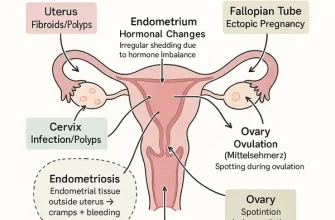For many women, irregular periods are a source of frustration and concern. But how do you know when to actually worry about them?
What Exactly Is an Irregular Period?
Before we panic, let’s make sure we understand what we’re dealing with. An irregular period doesn’t mean you’re in trouble every time Aunt Flo shows up a day late. A normal cycle can range from 21 to 35 days, with some variation from month to month. However, if your cycle is consistently unpredictable—for example, skipping multiple months or showing up every 20 days like clockwork—it might be time to pay closer attention.
Age Group and Likelihood of Irregular Cycle
| Age Group | Percentage of Irregular Cycles |
|---|---|
| Teenagers | 35% |
| Reproductive Age | 20% |
| Perimenopausal Age | 45% |
This chart illustrates the likelihood of irregular menstrual cycles across different age groups, showing higher prevalence among teenagers and women approaching menopause.
According to a recent survey from the American College of Obstetricians and Gynecologists (ACOG), around 14-25% of women have irregular menstrual cycles at some point in their lives. It’s more common than you might think!
Why Do Periods Become Irregular?
You might be wondering, “Why on Earth is my body doing this?” Good question! There are several common reasons for irregular periods, ranging from stress to lifestyle changes and hormonal fluctuations.
- Stress: High stress can impact your hormone levels, leading to delayed or missed periods.
- Weight Changes: Gaining or losing significant weight can also mess with your cycle.
- Hormonal Imbalances: Conditions like polycystic ovary syndrome (PCOS) or thyroid issues can disrupt your menstrual regularity.
- Medications: Some medications, especially those related to birth control, can lead to irregularities.
Causes of Irregular Periods
| Cause | Percentage of Cases |
|---|---|
| Stress | 30% |
| Hormonal Imbalances | 25% |
| Weight Changes | 20% |
| Medications | 15% |
| Other Causes | 10% |
This chart shows the percentage of various causes leading to irregular menstrual cycles, highlighting the most common reasons like stress and hormonal imbalances.
When Should You Be Concerned?
So, when is an irregular period more than just a hiccup in your cycle? Let’s break it down:
1. Frequent Skipping of Periods
If you’re skipping periods for three or more months in a row (and you’re not pregnant), it’s a good idea to visit your healthcare provider. Skipping often can indicate an underlying hormonal issue.
2. Heavy Bleeding
If you find yourself needing to change pads or tampons every hour or so, or your period lasts longer than seven days, this could point to a condition like fibroids or endometriosis that needs medical attention.
3. Severe Pain
A bit of cramping is normal, but if your cramps are so bad that you can’t go about your daily activities, it’s time to speak with a specialist.
4. Irregular Periods Accompanied by Other Symptoms
If you’re experiencing additional symptoms such as sudden weight gain, excessive facial hair, or fatigue, these could be signs of a condition like PCOS or thyroid dysfunction.
Fun Fact Break: Did You Know?
Did you know that irregular periods are particularly common in adolescents and women approaching menopause? This is due to fluctuating hormone levels during these phases of life (ACOG, 2023). So, if you’re a teen or nearing your 50s, some irregularity is actually pretty normal!
The Role of Lifestyle in Regulating Your Cycle
Impact of Various Lifestyle Factors on Menstrual Cycle Regularity
| Lifestyle Factor | Percentage of Irregular Cycles |
|---|---|
| Poor Diet | 30% |
| Excessive Exercise | 20% |
| Lack of Sleep | 25% |
| Chronic Stress | 35% |
This chart illustrates how various lifestyle factors such as poor diet, excessive exercise, lack of sleep, and chronic stress can impact menstrual cycle regularity.
Lifestyle factors play a huge role in menstrual health. Let’s consider a few practical adjustments:
- Balanced Diet: Proper nutrition can make a significant difference. Lack of key nutrients like iron, Vitamin D, or omega-3 fatty acids can affect your cycle.
- Exercise: Regular exercise helps maintain a healthy weight, which is crucial for hormonal balance. But—and here’s the kicker—too much exercise can also be a bad thing. If you’re training like an Olympic athlete, that might be why your cycle is off!
| Factor | Impact on Cycle |
|---|---|
| Diet | Missing nutrients can lead to missed or irregular periods. |
| Exercise | Moderate exercise helps; over-exercise can disrupt your cycle. |
| Sleep | Poor sleep habits can contribute to hormone imbalance. |
When in Doubt, See Your Doctor
It’s important to understand that not all irregular periods are cause for alarm. However, if something feels off, it’s always a good idea to speak to your doctor. Early diagnosis of conditions like PCOS, fibroids, or thyroid issues can make management easier and prevent complications down the road.
Editor’s Advice
If you notice persistent changes in your cycle that concern you, don’t ignore them. Our bodies have unique ways of telling us when something’s not quite right. A little proactive action goes a long way in managing reproductive health. And remember, there’s no harm in asking questions—that’s why your healthcare professionals are there!
Cycle Duration in Women with Different Health Conditions
| Health Condition | Average Cycle Duration (Days) |
|---|---|
| PCOS | 45 Days |
| Thyroid Issues | 40 Days |
| Normal Cycle | 28 Days |
This chart shows the average cycle duration for women with different health conditions, including PCOS, thyroid issues, and those with normal cycles.









